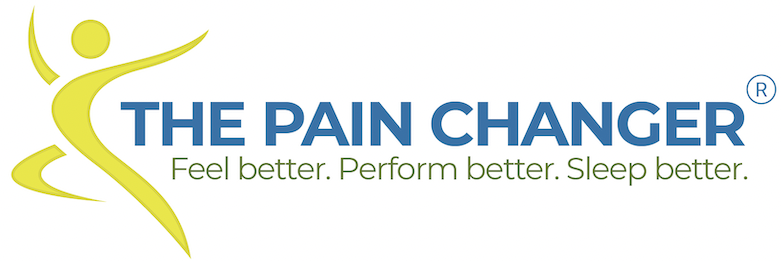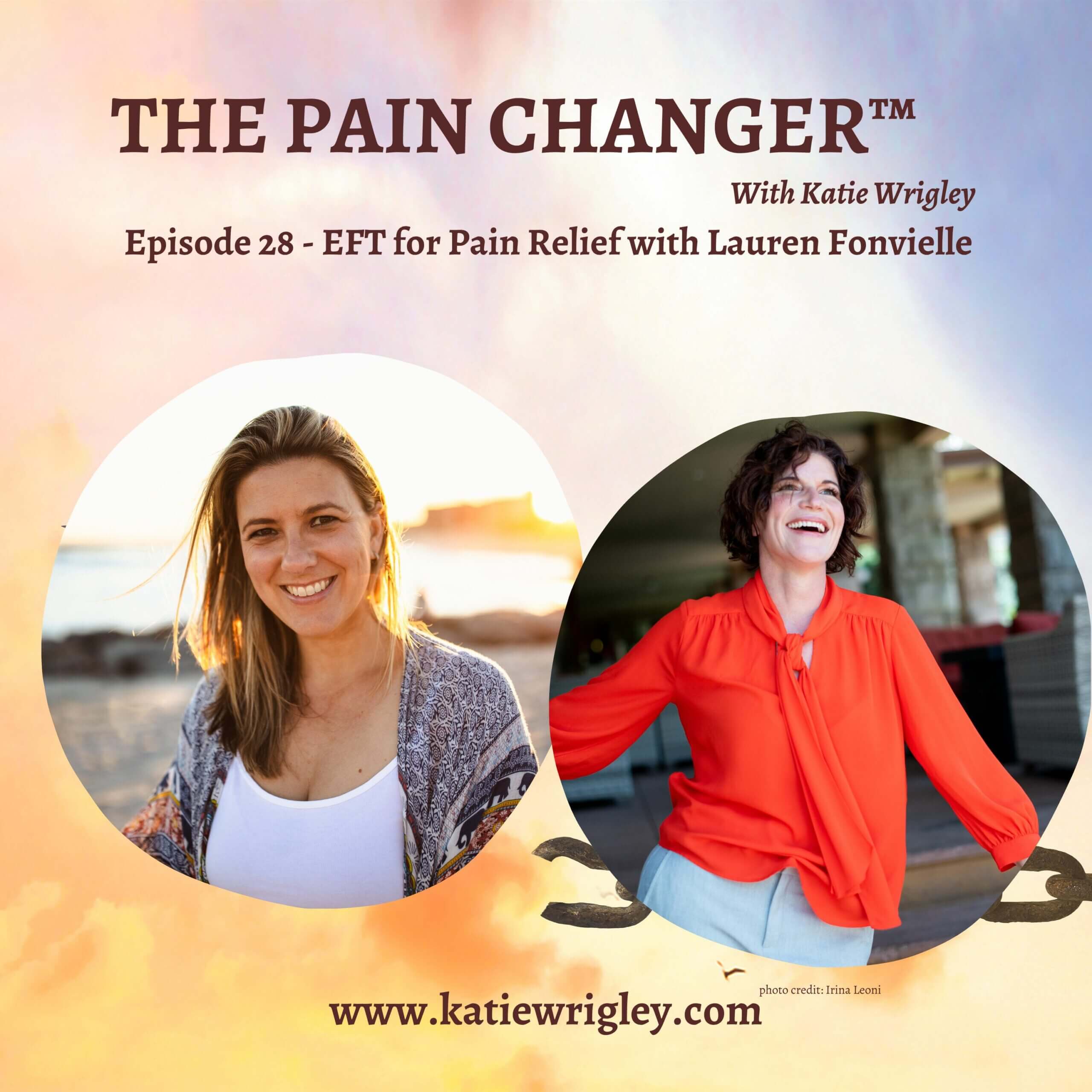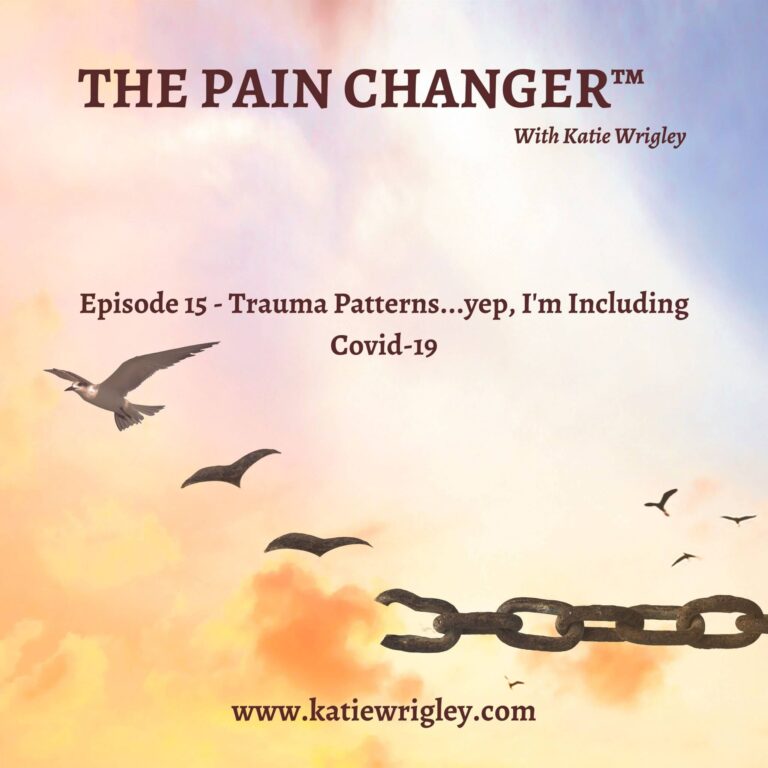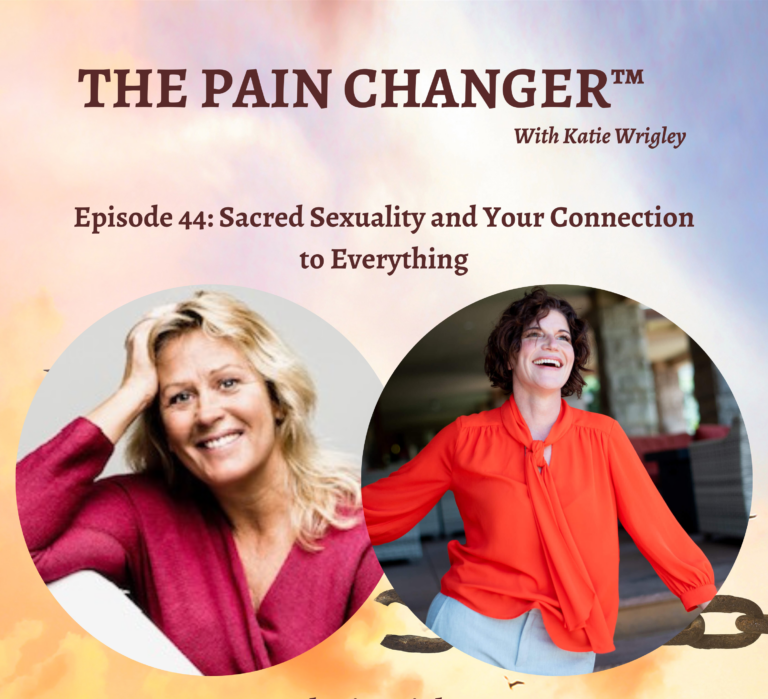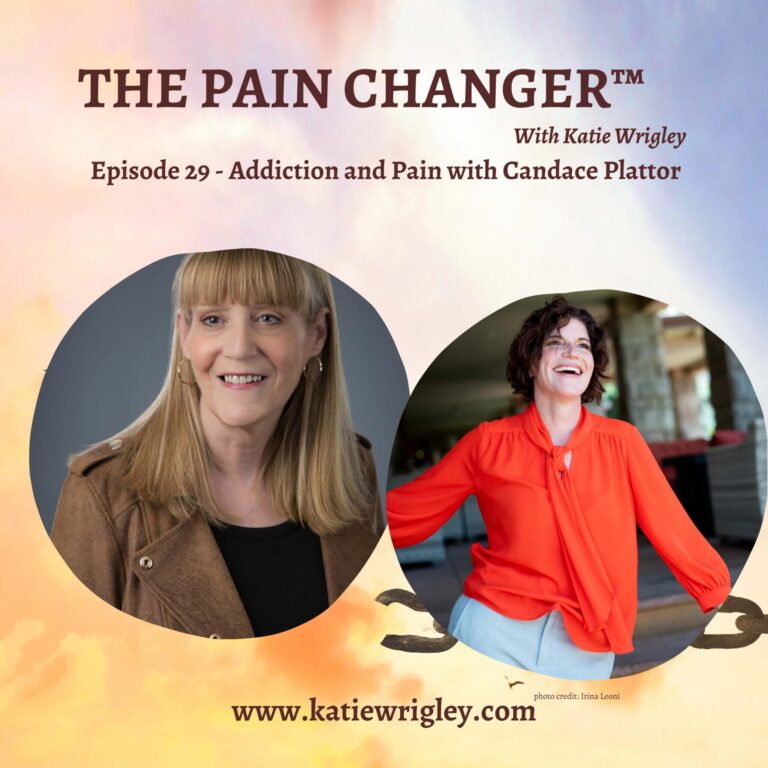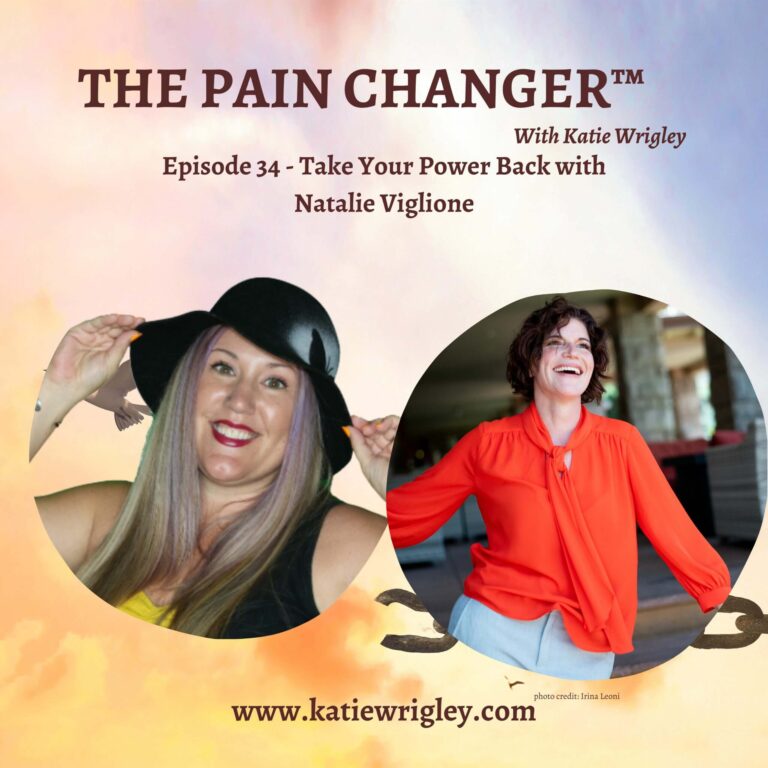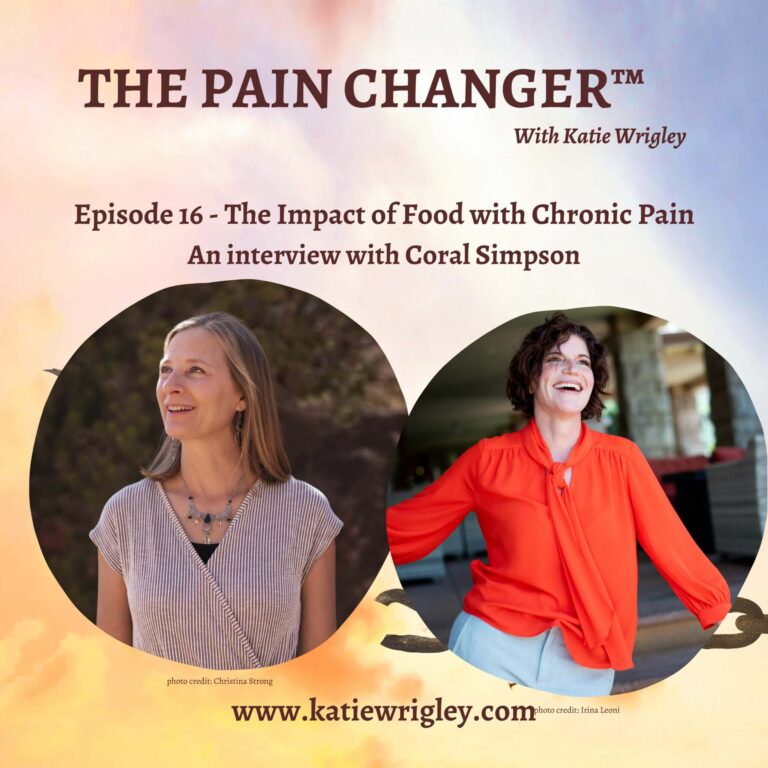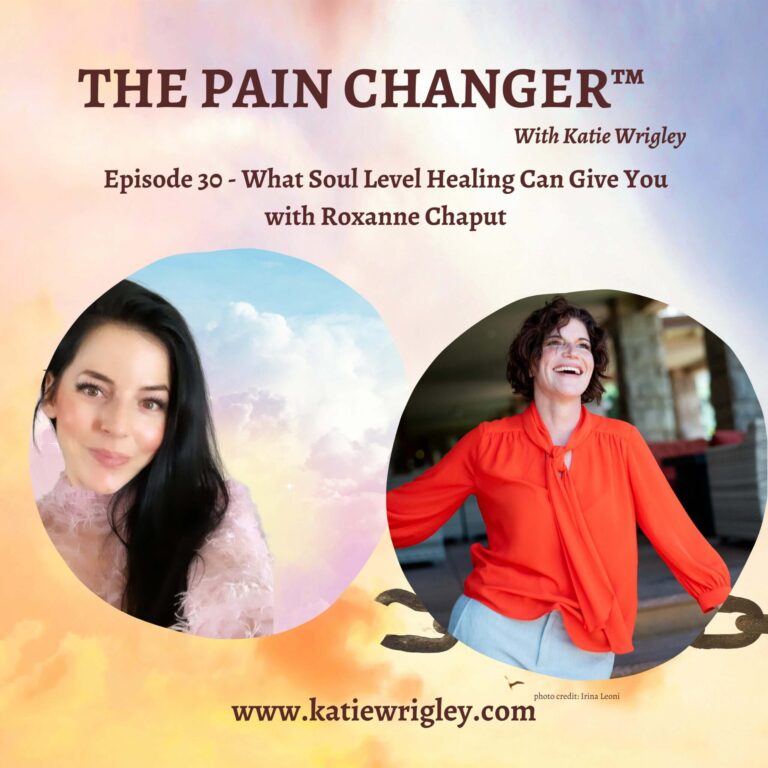Episode 28: EFT for Chronic Pain
Transcript…
In this episode, you will learn:
-
What tapping, or EFT is and how it can help
-
How much you can impact cortisol levels, a main component of stress, in just one EFT session
-
How it can offer relief from symptoms of trauma without going into the trauma itself
-
What my first EFT experience was like and what my body was trying to tell me at the time
Episode 28: EFT for Chronic Pain
Katie Wrigley 0:42
This is the pain changer podcast episode 28. Last week, I spent some time recapping everything we’ve been covering on the show and applying it to the four areas of impact. This week, we’re gonna go deep into EFT or emotional freedom technique with Lauren Fonvielle. To understand how tapping can help you find some relief. That’s coming right up. I hope you’ll stay tuned. So joining me today is Lauren Fonvielle. Lauren is an integrative energy practitioner specializing in EFT tapping for stress, anxiety and trauma. She guides her clients on a journey of self healing to break through obstacles, physical, mental or emotional, that are keeping them stuck and holding them back in life or business. She believes we all have the answers within and sometimes we need a little help accessing them. Welcome so much to the show, Lauren, I love what you say there. How are you today?
Lauren Fonvielle 1:44
I’m great. Thank you so much for having me today, Katie.
Katie Wrigley 1:46
Oh, yeah, it’s my pleasure. So would you be willing to share with us what got you into EFT and tapping? Yeah, absolutely.
Lauren Fonvielle 1:54
It was my own journey dealing with anxiety and stress. And when I get anxious, and I think when a lot of people are anxious and stressed, they feel that physically in their bodies. And for me, I was feeling physical pain in my jaw, my neck, my jaw, my shoulders, I have TMJ. And when I was first introduced to the idea of tapping, I thought it was very weird. I thought it was really out there. This idea that tapping on myself could reduce my anxiety and then also could reduce my physical pain. But then I experienced it for myself and had a really big shift in the first session and reduction in my pain. And then I was hooked. I was like, Alright, there’s obviously something to this. And I just kept practicing and studying and eventually went on to get certified so that I could share it with other people.
Katie Wrigley 2:51
Wow, that is so cool. And I’m finding that a lot of people wound up becoming interested in the modalities that gave them relief. And that was certainly the case with me too. EFT is really interesting to me for a few reasons. I had tried it myself with a similar outcome and a massive shift. And honestly it’s been several years since I did it. So I don’t remember and I had so much going on at the time. I don’t remember if it was anxiety or pain focus, but I remember going “What just happened?” And then for whatever reason, I avoided it. So what is it exactly with the tapping that does something in the body? Like what exactly are we accessing there?
Lauren Fonvielle 3:36
Yeah, so when I describe EFT and EFT stands for emotional freedom technique, and it’s this process of gently tapping on certain points of the body while simultaneously acknowledging the emotions that you’re feeling. And where you’re tapping are the endpoints of the meridians. And so when I describe it, I compare it to acupuncture because people are more familiar with acupuncture. So when you go to an acupuncturist, they take those tiny little needles and they put them in at certain points of the body. With tapping we are applying acupressure by gently tapping on some of these same points. And then there’s the added component of speaking out loud and acknowledging how you are feeling. And so by tapping on these points, it’s helping to release stuck energy that’s in the body. There is and I know that that can sound a little weird, right? Like, yeah, we’re tapping and it’s releasing energy you know, it’s sometimes talking about energy stuff can be challenging because it’s not something that you can see you know, or touch but it’s something. Energy is something that we feel we know when we are feeling tired and lack energy right or sad or upset and so you know, it can be it can feel a little bit out there, but there is a lot of science that backs this up. And so Dr. Peta Stapleton is one of the researchers in the field and has done some really amazing work. And what one of her studies has found is that as you’re tapping on these points, it’s actually sending a message to the amygdala in the brain. And the amygdala is that part of the brain that controls fight or flight. And it is telling, you know, when the amygdala is firing off, it’s for those situations when you need to fight back, or you need to run away. But when we’re talking about chronic stress, or chronic pain, the amygdala can be firing all the time, right. And it’s sending all this cortisol into the body, cortisol being the stress hormone. And so when we tap on these points, what her study found is that it sends a message to the amygdala telling the amygdala, “Hey, you don’t need to be in fight or flight.” And it’s been shown to reduce the amount of cortisol pumping through the body by up to 43%, which is a really, really big number. And so when we are able to reduce the amount of cortisol, then you feel calmer in your body. When you feel calmer in your body, then you can think more clearly. And you can make better decisions and feel better. And that’s what really, this work is all about, feeling better.
Katie Wrigley 6:15
Yes. And that was such a great description and explanation, thank you for that. I can tell you’re really excited and passionate about what you’re doing, which I love seeing in other practitioners. And so one of the things you mentioned there, and you know that I’m a cognomovement practitioner and tapping EFT is a tiny part of that. But one of the things you said in there that really speaks to me, as far as why it’s as effective as you just listed. And 43% reduction in cortisol levels in one session is amazing. I mean that is almost half of your physical, physiological response to stress, gone, right there. But what you had said there is saying it is really important, which is going to activate the auditory learning center. Same thing with the kinesthetic tapping, that’s going to do the kinesthetic piece, as well. And if you’re watching it, it’s going to also stimulate the Visual Learning Center too. And that’s one of the pieces that makes cognomovement so effective, as well, is all three of those learning centers are activated. And I would imagine that is probably a component, please correct me if I’m wrong, to why EFT is such a powerful technique too.
Lauren Fonvielle 7:27
Absolutely, there’s that mind-body connection and I think sometimes there’s all those studies that are out there that say, how we have the same thoughts. I don’t know what the percentage is, but we have the same thoughts every single day, right? And sometimes those are thoughts that are just circulating in our brain, we aren’t sharing them with anyone. And those can be negative, untrue thoughts. And so when you’re tapping and then you’re saying that thing out loud, something that can feel so true when you first get started in the process, and then you continue to tap and you continue to say that thing. What I’ve noticed myself, and what I’ve also seen in my clients is that something that can feel so incredibly true, deep down true, and then all of a sudden, you’re tapping and you’re saying it out loud, and you’re like, wait a second, that seems silly or that’s just ridiculous, or, you know, just start laughing or you feel confused. And, and sometimes that’s all that it takes to create that cognitive shift is to really speak the words out loud and hear yourself saying them, and you start to think about it a little bit differently.
Katie Wrigley 8:33
Yeah, absolutely. And I love that, you know, and we get cautioned as practitioners and as a coach too, the Compassionate part of me, goes into the story. And then I’m like, Okay, I’m coming back out of the story. Now I’m observing the story. Because the story most likely has components that aren’t true. And like you say, you don’t realize it till you’ve heard it enough times until you’ve released that out of your body so it isn’t your truth anymore. On this show, I’ve talked a good deal about how things get stuck in the body, and like I’ve referred to, you probably know this book as well, The Body Keeps the Score. And that’s by Bessel A. van der Kolk, I think is his name. Amazing, amazing book. And I’ve mentioned it a few times, and I’ll put it in the show notes again. But he talks about exactly this: We have emotion, we have energy that gets stuck in the body, and we have more and more technology that’s starting to show this, like in cognomovement, several of my practitioner friends and Bill and Liz, the cognomovement team, they utilize something called the bio well image which shows the energy coming out of your body. And it can also show where you have issues. So one of the things that you had mentioned is you can help with trauma as well, and I’ve talked a good deal on the show already in prior episodes about a lot of times we justify trauma like, “Oh, but I survived” and, great that you can look at that with gratitude. But what we tend to do as humans is keep it inside of us and diminish our experience rather than feeling everything fully. And still having gratitude that we survived it, we almost have to be taught that, and I remember him saying that he even talks about a story in the book where he actually gets robbed. But he didn’t get PTSD from it because he knew how to prevent getting PTSD because he’s a trauma expert. So is there anything different with approaching people with trauma, and I am going to share and I’m not setting you up for anything, but I’m going to share something really strange that happened with me prior to cognomovement with an EFT, EMDR. Specialist, and just curious, but is there anything different in your approach, if you are working with someone who has severe PTSD versus chronic pain versus an anxiety disorder that doesn’t have any trauma attached to it?
Lauren Fonvielle 11:06
I think the important thing to note with tapping and part of the reason why I love it so much is that it’s such a gentle approach. So it’s never something where if you are someone who has experienced PTSD, you don’t have to, you know, dive into the deep end and rehash everything that happened to you, maybe, you know, just thinking about, talking about it starts to get anxiety. And tapping, you can start right there, you know, until it feels safe enough for you to share stuff. And with tapping, you don’t ever, ever have to share anything that you don’t feel comfortable sharing with the practitioner. As long as you know the feeling in your body. You can come up with a code word to say what it was, you know, like the event or that night, whatever it’s going to make you tune into the feeling is really what is most important with the work. I would say the approach, you know, regardless of what the issue is, is the same. But with trauma, obviously you want to be extra, extra cautious and make sure that you’re approaching it in a very gentle way and that the person feels safe throughout the process.
Katie Wrigley 12:24
Yeah, absolutely. That’s critical. And I love that people don’t have to talk about it, you know that something in cognomovement to like, my ego wants to hear it so that I can mesh up, “Okay, this is what I see in the neurology.” But my job as a practitioner isn’t to hear their story. If they want to tell it to me, absolutely. I’m there to listen. But my job is to read their neurology and watch to see signs that it’s releasing from the body, and they don’t have to tell me anything. And I have had full sessions with someone just saying, “Okay, okay, okay.” And I have no idea what they’ve cleared, but I can see it. And it’s awesome and it’s strange. So now do you do the tapping on them? Or are they doing their own tapping on their body,
Lauren Fonvielle 13:10
They’re doing their own tapping. So I always will describe it as like Simon Says, a lot of my clients I work with virtually, I see a few in person. But I’m tapping on the same point, I will say a sentence, and then they will repeat that sentence. You know, the idea being that, you know, I’m always trying to reflect back to them, the things that they’ve said, in tapping, it’s really important to be using words that truly resonate with you. And, you know, I always tell my clients, like if I ever say something that feels a little off, or you want to change the wording, please do so because that’s such a key component to having this work is for it to feel true and authentic to you.
Katie Wrigley 13:52
Yeah, that makes total sense. And that’s similar to the work I do as well. So the practitioner I went to, he was EFT and EMDR. And he started off, so what he told me after this was he said I had such severe PTSD that my hypothalamus was shut down. The way that he had said that I don’t know if it was true or not, I think probably from what I had read about that, but he actually started tapping on my forehead. And it pissed me off. Like as he was sitting there tapping I was getting angrier and angrier. And I actually liked the guy like I was like, I don’t understand what’s happening here. I think he’s probably a really, really great therapist, but it wasn’t a good fit for me for where I was at the time, nor am I going to mention who he was. But would you, from your experience, what would you think had occurred there from my tiny brief synopsis of him by tapping on me pissing me off?
Lauren Fonvielle 15:03
Yeah, I mean, it’s probably layered, there’s probably a reason. There’s probably reasons that maybe you’re not even aware of as to why, you know, that was so that was so bothersome. But, I mean, did he ask if he could tap on you?
Katie Wrigley 15:21
He did, he did ask permission. And another, I think it was my chiropractor who I was going to at the time was like “They shouldn’t have touched you.” I was like, well, he asked, it’s not like he came at me and just started thumping me without my permission. That would have been really, really invasive and not at all appropriate. And no he did ask.
Lauren Fonvielle 15:40
Yeah, okay, well, sometimes, when so I don’t know what it was that you were tapping on. But sometimes when you start the tapping process, whether you’re tapping on yourself, which is typically how I work, or I guess if somebody else is tapping on you, if you are tuning into something, right, you’re bringing your attention to something that maybe you’ve you haven’t brought your attention to, or you’ve you’ve been suppressing the feeling of it can it can intensify it. So you know, if you were dealing with some, you know, an issue that was making you angry, and now you’re tapping on, you know, you’re tapping about this issue about how this thing made you angry, you can feel that anger, sometimes, you know, before it’s gonna release, sometimes it can, it can get stronger. So it’s possible that that’s what was happening too like, the feeling was just intensifying around whatever it was that you were working on. And I will tell people that if that’s the case, if you start tapping for the first time and you feel whatever the emotion is, whether it’s anger, or sadness, or overwhelm, or anxiety, if it feels like it’s stronger, the intensity is getting stronger, it doesn’t mean that the practice doesn’t work for you. It literally means it does work for you. You just need to keep tapping to be able to use it.
Katie Wrigley 16:59
Yes. So unbeknownst to you, you’re just totally validated your expertise, which I figured you probably were gonna wind up doing. So what was going on just to provide context, I hadn’t yet acknowledged my childhood trauma, which was severe and long going. So that was completely still repressed at that point of time, even though I had an inkling. And I’d only been doing a couple of months of … Oh, no, no, this was before my wellness coach, I hadn’t even started working with my wellness coach and doing anything mind-body yet. And so my default emotion used to be anger. So yeah, that makes total sense. So it was working, and he backed away from it. Whereas if he had kept going, he may have been able to help me shift it a little bit more. But I think I was kind of freaking him out, because I was, he wasn’t hurting me at all. He was gentle tapping, just like you said, and I was just getting more and more pissed. And like, I tried to go back the next week, like when I thought of him again, I was angry. I was like, “Okay, I don’t know what’s going on here.” But what you just said, totally makes sense. And I did have a lot of anger, which I’ve now processed out that was directly related to what happened to me as a kid.
Lauren Fonvielle 18:22
Yeah, it was your body’s way of communicating with you.
Katie Wrigley 18:26
Yep. And I didn’t know how to listen at that point.
Lauren Fonvielle 18:30
Right. Right. But you do now. So that’s the process, right? Most people don’t. You know, most people, when we experience an emotion that we are not comfortable experiencing, whether that be sadness, frustration, anger, whatever it is, most of us will, what I call, stuff it down. We push it down, then we redirect our attention somewhere else, and we distract ourselves. And while that can work for the short term, and you can feel better maybe in the moment for a little while. It almost always, pretty much always comes back to bite you because that stuff that you have stuffed down, you can only stuff it so far before it builds up to a point where it’s going to come out in some way. And sometimes that comes out emotionally. And sometimes that comes out physically. And it’s you know, it’s your body’s way of communicating with you and I always like to say we have to listen to our body when she whispers because otherwise we’re gonna have to hear her scream. You know, if you don’t listen when she’s whispering you’re gonna have to hear her scream and nobody wants to hear their bias.
Katie Wrigley 19:37
That is such a great analogy and you’re right you know, and it came out in me and what I used to call my mini meltdowns where I would just spiral and anxiety and just completely emotionally meltdown one day because I wasn’t dealing with anything and then it came out and rage attacks and then now I’ve got my my ball and so I much more even keeled and nothing’s really stuck in my body anymore. And of course, it also culminated in chronic pain in me as well. So part of cognomovement, we have a lot of different ways that if we see or sense a subconscious block, we can kind of shift what we’re doing and be able to get around it. So is that, I’m just curious, because I’m thinking like, okay, if we’re tapping on the body, we’re not even, we are focused, it is utilizing the mind. But I’m curious how much the subconscious is playing in there? Do you still see subconscious blocks coming up? And how can you navigate those?
Lauren Fonvielle 20:36
Yeah. So you know, it’s very much so, a collaborative process. So I’m always encouraging my clients to share how they are, how they are feeling, and any thoughts that come up. And sometimes those thoughts feel, they feel like they’re random thoughts, or they feel like they’re unrelated thoughts. And I always like to share my personal story of, when I had really severe TMJ and I was tapping, what came up for me, because it helps people to kind of understand. So when I had that first session, the practitioner, you know, was asking me a whole bunch of questions. And the first thing that we tapped on was how it made me feel really frustrated that I had this pain that I was dealing with. And then you know, she kept asking me questions, and that frustration really turned into anger towards my dentist, because that’s what really triggered my TMJ was when I got my wisdom teeth removed, and they had to dislocate my jaw. And I didn’t know that they were going to do that. And now mind you, this is like 15 years after I had my wisdom teeth out. So it’s been a long time, I really was unaware of how much anger I was holding on to, towards that dentist. And then the feelings of anger kind of turned into this feeling of betrayal, because I did not know that he was going to do that. And I felt betrayed in the process. And then this is where the story gets interesting, because I had this, what I felt like was an unrelated thought, I’ve had this memory pop up from a completely different time in my life, of when I was betrayed by a friend. And so in my mind, I’m like, Oh, that’s not related to this, you know, but I shared it because the practitioner kept, you know, reminding me whatever’s coming up, please share it. And so she said, “Okay, I get that you don’t think it’s related, but we’re going to tap on it anyway.” And so we tapped on that situation and the betrayal of the friend. And ultimately, it led to me feeling sad, that that friendship was no longer right. And by the end of that session, what started with me feeling really frustrated about dealing with the pain ended with me feeling sad about losing a friend. And then when I checked back in with the pain, I went from an eight to a two. So it was like a huge, huge shift for me. And so, you know, those subconscious thoughts definitely come up. And I like to remind people that when a thought comes up, it’s not coming up for you to ignore it, it’s coming up for you to explore it and to be open with the possibility that there is a connection, even if it doesn’t make sense to you. Because, you know, as humans, we want to understand things, we want everything to make sense, we want to tie it with a pretty little bow. And sometimes, in the beginning at least, that doesn’t happen. And so it’s this process of really connecting the dots and being open to where the next dot is. Like following the breadcrumbs.
Katie Wrigley 23:55
And that being open can be so much harder than it seems because we’re so sure we understand what’s going on in us like, “Nope, couldn’t possibly be related.” Except, humor me. Right? Maybe it is. Maybe it’s a layer we don’t know, you know, but that’s interesting. So I looked at my trusty little Louise Hay book, Heal Your Body, just out of curiosity with what you were saying around some of the issues in your jaw. So it says for TMJ, anger, resentment, desire for revenge, and that’s what you were saying you had anger that came up. That was linked to a betrayal that caused you a lot of grief. And yeah, a lot of times grief goes into anger. When we think about how unjust or unfair it was, betrayal, oftentimes, is linked to deep grief, huge lack of trust, and a lot of anger in there. So wow, that’s just that’s incredible to hear. I love hearing stories like that.
Lauren Fonvielle 24:53
It was a life changing experience for me because, you know, that was my first tapping session. I went to that, because in a group session when I was first introduced to tapping, I noticed Oh, yeah, I do feel a little bit calmer when we were tapping as a group. And I was like, “She says, this can help with pain. Well, let’s, really see if it can help with pain, because I’ve been doing all sorts of things to try and, you know, help myself with my job, whether it was wearing the night guard that the dentist had made or doing peppermint oil or eating softer foods, and, you know, all that stuff.” So then when I realized, “Oh, wow, there really was obviously a lot of anger that was caught up in there.” And it made it so incredibly clear that there are emotional components to physical pain. And that has been shown again and again, in working with my clients.
Katie Wrigley 25:46
Oh, yeah. Yes, I see the same, you know, and there’s a huge correlation between stress and pain, too. And anxiety, I have not had a case where someone has pain and does not have anxiety or fear attached, like it has not existed in my experience so far. You’re nodding along as well. Do you see the same?
Lauren Fonvielle 26:06
Absolutely. Yeah.
Katie Wrigley 26:08
And it makes sense. You know, with every expert I talked to, you know, I’m understanding things. And I already had a really deep understanding but “You can always learn more” has been my mindset and I’m really experiencing that. And I’m understanding on deeper and deeper levels, just how tightly, deeply, almost permanently, I’m not going to use that word, though, fear and pain are linked. And there’s so much in that, you know, and I talked to another expert around sleep, on another episode. And she was mentioning, you know, for most people who think they have insomnia, they actually don’t have insomnia. They just spend so much time fearing that they can’t sleep, that they then can’t sleep.
Lauren Fonvielle 26:59
Yeah, you get caught in this loop, right? The fear about the thing and the thing happens, and then there’s fear that it’s going to happen again, or it’s when is it going to end and you just get in this, the cycle on the hamster wheel, and you need to break the cycle?
Katie Wrigley 27:15
Yep, yeah, we refer to that as the emotion thought loop in cognomovement. And then I also call it the pain loop too. The pain loop is going to go from whatever pain receptors triggered in your body up to your brain. That’s the loop there, the emotion thought, you know, and I had thought a lot of people thought for the first time the thought comes first, “I’m anxious”, and then we feel it. It’s actually the opposite. It’s that we feel it in the body first. And as a side note, unless we feel it somewhere in our body, we really actually don’t care. It is literally not on our radar at all. It’s not like you pass and go, Oh, I don’t care. It literally does not even get absorbed in your mind. It’s nowhere on your radar whatsoever. When you feel it in the body. That’s when you care about it. And so we feel something, then we identify it like, “Okay, this is this feeling, oh, that’s anxiety, why am I anxious?” And then we find reasons for it. And one of the things I’ve, I’ve been digging deeper and deeper in anxiety. And just last week, I did another session around it and every time I go back to it, it breaks apart more and more. But I had this, it was a multi level realization, but one of them was that anxiety is almost easier for me to feel than grief. Because I’ve been so anxious for so much of my life. And I would get anxious or angry without acknowledging sadness or grief for so long. And I’m still in the middle of shifting that because I know it’s important to feel everything I’m feeling and not just offloaded as anger or resentment or whatever it may be. But I really noticed like, “Ooh, it’s so much I’m so much more comfortable with anxiety than with sadness or grief.” And so that’s one I’m going to continue to work on like, Okay, what is the emotion I don’t want to feel here. That’s bringing up anxiety. And it was weird, because once it was gone, it’s like I don’t really know how to feel right now. So then I went and I actually mapped in how I want to feel in different situations where anxiety came up, like whether I want to be excited or whether I want to feel peace or whether I want to feel joy or neutrality like something in the place of it. But yeah, that fear/pain loop just stays in there and it gets stuck.
Lauren Fonvielle 29:40
Yeah, we get so used to it, right? It becomes, “normal” to feel anxious all the time. It’s like, what you’re used to and then that’s problematic, right? We know we shouldn’t be in that state of chronic stress all the time. Like that’s not a healthy way of being. And so sometimes it’s hard for people to even… Well, I mean, there’s definitely clients that I’ve worked with that, that there’s, you know, negative thoughts around rest.
Katie Wrigley 30:15
Yes!
Lauren Fonvielle 30:17
Yeah! It’s like, “No, It’s okay to rest. It’s okay to just be.” Yeah. And, you know, there’s also like how you were saying, this feeling uncomfortable with grief and sadness. Sometimes there’s almost a fear associated with even feeling the feelings, because I’ve had clients say, you know, it feels like if they allow themselves to go there, if they allow themselves to feel the sadness, that they’re never going to come back from it. Yeah. And, in reality, it’s this idea of, by not allowing yourself to feel it, it’s like you’re running from it, it’s chasing you, it’s constantly chasing you. Whereas if you allow yourself to sit with it, even if just for a short while, it’s going to then move through you. Right, so then you’re not running from it anymore. And that’s where you’re gonna find that peace.
Katie Wrigley 31:16
Yeah, absolutely. And that’s the only way I found out of pain right now is through it, it’s experiencing the emotion, it’s experiencing the physical pain, and it’s not with judgment, it is acknowledging it, it is describing it, it is allowing it to be there and understanding what your body is trying to tell you with the sensations you’re feeling. And it is scary, you know, when we lose someone, it alters our world, right. And so we hold on, and then the next time we think about grief, we go back to that time that was so bad that we weren’t sure if we’re going to survive, that felt like hell, for months or years sometimes, you know. When we have deep grief situations, it’s understandable that fear comes with that and that it’s easier to feel and want to switch to other emotions. And that grief is still gonna stay in your body until you fully acknowledge it. And then the faster you’re able to acknowledge it, even if you have to do it in layers, maybe you just do a little bit this week. That’s all you can take, awesome! You got that out of your body, go back to it again, and get more out, pull it out in layers, if that’s easier for you instead of one fell swoop. That can sometimes, and we’ve seen that with cognomovement, I don’t know if you have with EFT where you have such a powerful session, sometimes the body doesn’t know what to do for a couple of days. And you know, I haven’t had this happen myself. But the closest I had was my session last week and the day after, I was just exhausted all day. And then I slept like a baby but it was crazy because I could see the difference. I have an aura ring to measure metrics, and my resting pulse dropped three beats a minute after that session, and it has stayed lower for days, it wasn’t just a fluke, it has stayed lower since I deleted that anxiety. And I slept like a baby after that. And it was like, wow, but I still kind of had that uncomfortableness and uncertainty with what to do. And we’ve had people say, you know, they were in bed for two days after a session then they get out of bed and they feel amazing. But the neurology just doesn’t even know what to do in the absence of that pattern. And so you just rest until your body’s like, “Okay, I know what to do now”. So have you seen that in EFT as well?
Lauren Fonvielle 33:41
Yeah, your body sometimes needs to catch up, which is why I’m always telling people you know, just be mindful of the thoughts that come up after a session or how your body’s feeling and listening to your body. And yeah, I do feel like the body sometimes needs a minute. With all the processing that’s happened for sure.
Katie Wrigley 34:02
Yeah, it certainly does. You know, and with people who are in chronic pain, I tend to err on the side of caution at first and go a little bit slower because I don’t want to have that impact of disrupting the neurology even further because the subconscious mind is still in a heightened sense of sensitivity if you are experiencing chronic pain, and I’ve learned, okay, higher level of sensitivity means me go slower. And just to note for anybody who may be having a struggle with rest right now, I’ve really been making a valiant effort to tie it into my schedule. It’s still incredibly uncomfortable for me and I have been vastly more productive. Since I have allowed myself this time. It is so weird. Like I both understand it and don’t understand it at the same time, because I’m actually living it like if I saw someone else doing it, I’d be like, Oh yeah, go a little bit louder. Then just tell them exactly because you’re now streamlining your time, you have more energy, you’re more effective. That’s why this looks this way, even though to you it feels like you’re being lazy and you’re spending more downtime. Yes, you’re spending more downtime. But because of that, your uptime, you’re going two to three times the pace that you were before without even realizing it without spending any more energy doing that, because I’ve recharged my batteries. so well. So now I get it.
Lauren Fonvielle 35:28
But yeah, like you can’t pour from an empty cup. And I think it’s also society, right? Like, they have to like, go, go, go, push, push, push, if we’re not working, then we’re lazy, like all of these limiting beliefs that have been, you know, likely taught to us from childhood that, you know, were demonstrated to us and because of that they feel true, but they aren’t true, right? Oh, yes. Yeah. So working through that, letting go of those beliefs, and then getting back to that place of feeling good in your body.
Katie Wrigley 36:09
And it’s a process, you know, and I think back to my days in corporate, and I hear that, you know, they refer to it as a culture of busyness, you know, and I’d hear people get commended. “Oh, so and so worked through the weekend on that project. Thank you so much.” It’s like, ah, and I’d hear that and like, you’re encouraging people not to rest, like, please stop doing that, like this is… Somebody’s like “Well what If they want to?” like, okay, yeah, they may want to, but they’re going to burn out a lot faster, because they’re not resting like this is critical, but it’s a process, especially if you are identifying as type A, which is at the utmost level of doing doing doing all the time, you can’t just hit the brakes, and go from 100 miles an hour to a balance of rest, give yourself time to down regulate your schedule, to have a balance to make that shift, because it’s going to be startling, and uncomfortable. And you’re going to want to see proof that you’re still performing at the level that you want to perform.
Lauren Fonvielle 37:17
Somebody like specifically talking about corporate, I would say one of the like, easier things to try and implement to help give yourself some extra time and space is like if you’re somebody who is on conference calls all the time, like overbook it a little bit on your calendar so that at the end of that call, you’ll have 15 minutes right before you have that next call, so that you can reset because even a little bit of time like that, for you to rest is going to make a difference if you’re somebody who’s in back to back meetings constantly.
Katie Wrigley 37:51
Yep. Absolutely. When I was in corporate, I was encouraging people to do that as well. And I encourage people to do that. However, they’re seeing me now as a coach. But yeah, that time factor and that energy, that it’s so important to all of us, you know, we get locked into it. We have to do, do, do all the time. Maybe you don’t, maybe you can start to explore something else and give your body a rest.
Lauren Fonvielle 38:20
Yeah, exactly. And if you’re somebody that lives and dies by your calendar, like me, like book that time on your calendar for yourself, because it makes a real difference to if you have the appointment with yourself, you’re more likely to keep it at least that’s what I’ve found.
Katie Wrigley 38:35
Yeah, that’s a great point. And you’re right, you know, and I put things on my calendar all the time that are for me, like when I’m about to launch a six week program. So I carved out four hours of the day before that, because one, it’s later in the evening for me, so I want to make sure that I’m resting and so that I’m hitting that call and those classes with full energy, even though it’s a time of day, I’m not used to having it. So I’ve moved my day. And it’s like when I see that on my calendar, mentally it’s like, “Ooh! I have me-time today.” like I already see it. And it makes me all excited, like, “Ooh, I can spend this however I want. Ooh, what’s going to be the most restful for me, so I feel energized!” Like, just seeing it on my calendar coming up. I’m already starting to think of all these ideas. And I may actually, because I’m noticing this uptick of energy, just even talking to you about it again, Lauren, I may actually just do that for myself every week. Yeah, take half of one day for me. And maybe that day, I want to focus on my business. Maybe I want to do another podcast episode. Maybe I want to do some writing. Maybe I just want to relax. Maybe I want to catch up on someone else’s podcast or maybe I want to go out in nature, but it’ll be something allocated for whatever I want as part of my wellness.
Lauren Fonvielle 39:52
I love that. I think you should do it.
Katie Wrigley 39:54
I think I will. I’ll let you know how it goes. So I want to make sure people know where to find you. You had mentioned that you do in person and virtual and you also mentioned, EFT works one on one and also in a group?
Lauren Fonvielle 40:09
Yes, yes. So it can work in both ways. I also teach a yoga class that incorporates EFT so there’s movement involved with the tapping too. So there’s lots of different ways to incorporate tapping. You know, I think the one on one sessions are really beneficial when you’ve got stuff going on and you want to go deeper, having someone to guide you through that process is really, really, really helpful. And so yeah, people can find me at mindshiftwithlauren.com. I also have a free masterclass on my website that goes into a lot of the science behind why it works, how it works. So if you’ve been intrigued by this conversation and you want to learn more, you can access the free masterclass by going to mindshiftwithlauren.com/masterclass. And yeah you can find me on Instagram too @mindshiftwithLauren.
Katie Wrigley 41:10
Awesome, very cool. And so people can work with you virtually and in person as well. Either group or one on one?
Lauren Fonvielle 41:17
Yes, yes. So I’m located in Delaware, Middletown, Delaware, Delaware. But yeah, like I said, I do a lot of work virtually both, both individually and in groups.
Katie Wrigley 41:31
Awesome. Very cool. Well, I will definitely check out your masterclass. Like I said, the EFT is really intriguing to me both from my own experience and breakthroughs and puzzles, which I now understand were actually another breakthrough. I just didn’t allow it to come through. And you know, it’s also one of the elements within cognomovement. But this has been really awesome today, Lauren. I love the passion that you talk about it. I love the excitement, I can tell you really get a lot out of what you’re doing to help people. So thank you so much for what you’re putting out there into the world.
Lauren Fonvielle 42:02
Thank you so much for having me. This was a great conversation.
Katie Wrigley 42:05
Awesome. And again, I’m gonna have that in the show notes so that you guys can go find Lauren, go check out what she does. Clearly, she knows what she’s talking about. I wasn’t trying to set her up for anything by sharing part of my story, but she wound up validating her own expertise, by being able to give me more information on what was actually happening and it lined up with the context. So check her out. I think you guys will be pleasantly surprised and experience EFT for yourself. And thank you as always for joining me today. I hope this helped all of you understand more about EFT and how it can help you either with emotions or physical pain. And starting next week, the episodes are going to be focused around various aspects of mental health in order to honor Mental Health Awareness Month, which is in October. Candice platter, a family addiction specialist is going to be joining me to talk about addiction and how both the addict and your family can come back from addiction. I hope you’ll join me again next week. Until then, don’t forget, chronic doesn’t have to mean permanent.
